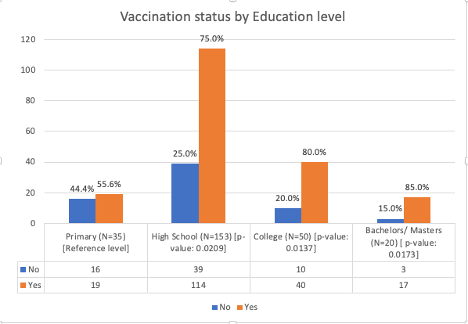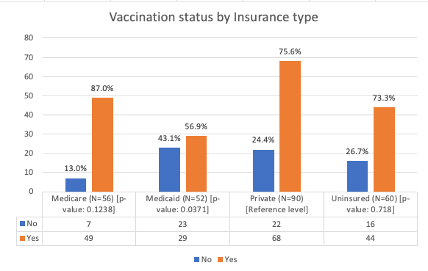Session Information
Session Type: Poster Session A
Session Time: 1:00PM-3:00PM
Background/Purpose: Patients with rheumatologic diseases have had hesitation with COVID-19 vaccines despite the recent reports that they are safe and effective. This might impact underserved populations disproportionately. The aims of this study are: 1- to identify the vaccination rates against Covid-19 and the frequency of vaccine-related adverse events in Rheumatology patients; and 2- to explore the factors associated with lack of vaccination
Methods: This was a questionnaire-based study. Descriptive data on the frequency of vaccine-related adverse events were recorded. Using logistic regression analysis, we studied the association of different factors with patients’ vaccination status. Odds ratios and 95% confidence intervals were reported.
Results: 258 patients participated in the study from October 2021 to January 2022. The most common diagnosis was Rheumatoid arthritis (33%) followed by Systemic Lupus Erythematosus (22%) and osteoarthritis (20.9%). Patients were mostly females (81.8%) and African Americans (72.4%). The majority of patients (61.2%) had elementary school education. 41.4% of patients had Medicare/Medicaid, and 23.4% were uninsured. Three-quarters (73.6%) of patients were vaccinated against Covid-19 with most receiving mRNA vaccines (97%). A quarter of the vaccinated patients stated that they experienced symptoms after the vaccine, mainly myalgias (60%), fatigue (69%), and arm soreness (76.3%). Seven patients reported skin rash. 2 out of 7 had a generalized rash requiring dermatology evaluation and topical steroids while the rest had injection site rash. Twelve patients reported joint swelling, out of them, 3 had not achieved low disease activity prior to being vaccinated requiring escalation of treatment while others did not seek medical care as the swelling was short-lived. For most patients (70%), the symptoms resolved within 24-72 hours. For patients who chose not to get vaccinated, the most common reason was a concern for side effects (88%) and disease flare (82.3%). 35.6% of the patients had a discussion with their providers regarding vaccine hesitation. It was interesting to note that 49.4% of patients who did not receive the vaccine were willing to change their minds if more convincing data emerges. By the time this data was collected, 10.7% of the patients had received their third dose of the vaccine. No statistically significant differences in vaccination status were found based on specific rheumatologic diseases. No difference was found based on race or ethnic background. However, participants with a college degree (adjusted OR= 4.26, p-value 0.0137) and bachelor’s/master’s degrees (adjusted OR=6.48, p-value 0.0173) showed significantly higher rates of vaccination compared to patients with primary education. Low-income participants (Medicaid) had significantly lower rates of vaccination (adjusted OR=0.44, p-value 0.0371)
Conclusion: Based on the findings, we can conclude that the frequency of immune-related adverse events due to COVID vaccines was low and symptoms were mild and short-lived. We can also conclude that lower socio-economic statuses as reflected by education and insurance levels can negatively impact vaccination rates in patients with rheumatologic diseases.
To cite this abstract in AMA style:
Zulfiqar B, Bittar M, Austin D, Hunter A. COVID Vaccinations in Patients with Rheumatologic Diseases- perspectives and Disparities in a Safety-net Tertiary Care Hospital in Memphis, Tennessee [abstract]. Arthritis Rheumatol. 2022; 74 (suppl 9). https://acrabstracts.org/abstract/covid-vaccinations-in-patients-with-rheumatologic-diseases-perspectives-and-disparities-in-a-safety-net-tertiary-care-hospital-in-memphis-tennessee/. Accessed .« Back to ACR Convergence 2022
ACR Meeting Abstracts - https://acrabstracts.org/abstract/covid-vaccinations-in-patients-with-rheumatologic-diseases-perspectives-and-disparities-in-a-safety-net-tertiary-care-hospital-in-memphis-tennessee/



